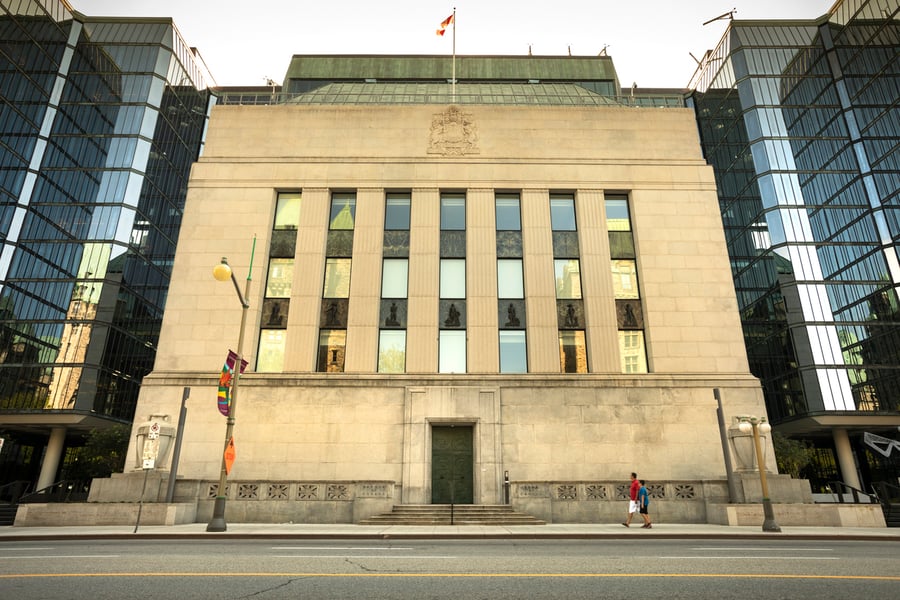Experts warn of slower investment, mortgage market shifts, and potential rate cuts

The uncertainty surrounding Canada’s trade relationship with the United States is adding pressure on businesses and financial markets, with mortgage professionals closely watching how the Bank of Canada will respond.
Experts warn that trade instability, particularly the looming review of the Canada-United States-Mexico Agreement (CUSMA), is acting as a “tax on businesses,” slowing investment and economic decision-making.
Though Canada secured a temporary reprieve from US tariffs this week, economists said that the risk remains high. Bank of Nova Scotia economist Derek Holt noted that US President Donald Trump’s statement left the door open for further trade tensions.
“Read that carefully. I think it means onward we go into CUSMA/USMCA talks with Trump setting the same wildly unrealistic timeline he did the last time,” Holt said. “Trump will push for a rapid deal, and when Canada digs in on important issues, he may well threaten tariffs again.”
Economists warn that the trade standoff could discourage business investment and impact consumer confidence – factors that could influence the mortgage market. Royal Bank of Canada chief economist Frances Donald highlighted that uncertainty itself has economic consequences.
Read more: Canadian economy hugely vulnerable to tariff shock, says former BoC governor
“The tensions and fogginess around the US-Canada trade relationship is probably going to weigh on many businesses and households in Canada who don’t have a clear understanding of what the business outlook looks like,” Donald said. “We’re expecting to see a pause in large business decisions in core sectors in Canada, and… this uncertainty acts, in and of itself as a tax on businesses who can’t operate the way they normally would.”
Markets have responded with increased volatility. Prior to Canada’s tariff reprieve, speculation of an emergency Bank of Canada rate cut had intensified, according to Bloomberg News. The Bank of Canada recently lowered its policy rate by 25 basis points to 3%, but further cuts may be necessary if trade tensions escalate.
With the next rate decision set for March 12, Desjardins Group chief economist Jimmy Jean believes policymakers will adopt a wait-and-see approach.
“Typically, they want to react based on evidence, what’s really happening and not so much, what’s speculative,” Jean said. “My sense would be that they’re going to wait.”
However, if a full-blown tariff war emerges, Jean expects the central bank to cut rates aggressively, potentially by more than 25 basis points. The Bank of Canada itself has warned that a trade war could cause the economy to shrink by 2.5% to 3% within a year. In contrast, without a trade conflict, the economy is projected to grow by 1.8% in 2024.
Some experts argue that interest rates should already be lower. Robert Embree, senior economist at Rosenberg Research & Associates Inc., believes the current rate is too restrictive, regardless of whether tariffs materialize.
“The Bank of Canada is still above the neutral rate, which is hard to justify even without the tariffs,” he said.
The Bank of Montreal has revised its forecasts, now expecting 50 basis points of rate cuts by the summer and slightly weaker GDP growth of 1.7% in 2025, down from its previous 1.9% projection.
“Consequently, we have mostly returned to where we were before, in terms of our forecast. But this tariff ‘scare’ is leaving a legacy,” said BMO deputy chief economist Michael Gregory noted in a client report.
As trade concerns mount, Canadian policymakers are looking for ways to make the economy more resilient. There is growing support for reducing interprovincial trade barriers, which could unlock new economic opportunities domestically.
Prime Minister Justin Trudeau is set to host a Canada-US Economic Summit in Toronto this Friday, bringing together business and labour leaders to discuss economic growth strategies.
“Economists for several years now have been highlighting that Canada’s economic potential is bottom of the barrel and has almost never been worse,” Donald said. “But now we’re starting to see real focus on a variety of economic files that could be Canada’s economic future.”
Make sure to get all the latest news to your inbox on Canada’s mortgage and housing markets by signing up for our free daily newsletter here.



